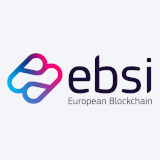The Commission is working with EU Member States (and beyond) to build EBSI. Through this infrastructure, Blockchain technology will entirely transform the identification of verifiable credentials
European Blockchain Service Infrastructure (EBSI)
EQAR is enabling the use of DEQAR data on external quality assurance within the EBSI ecosystem. This allows recognised European higher education institutions to easily confirm their accreditation status and thus facilitates adoption of EBSI digital diplomas.
The EU is developing a technical architecture for digitally-issued education diplomas as part of the European Blockchain Service Infrastructure (EBSI). The EBSI Diplomas Use Case addresses the same needs as the European Digital Credentials for Learning, based on a different underlying technical platform. Yet, both initiatives are compatible and based on the same higher-level data models and standards.
EBSI is based on contemporary standards for decentralised identification (W3C DIDs) and digital credentials (W3C Verifiable Credentials). Education diplomas are a specific type of verifiable credential (VC) in EBSI. Likewise, external quality assurance or accreditation are also represented as a digitally-signed VC that authorise specific higher education institutions to issue education diplomas.
EQAR has worked to enable the use of DEQAR data on external quality assurance and accreditation as part of the EBSI Early Adopters Programme, in close dialogue with the EBSI architects and the convenors of the Diplomas Use Case. Using SSI Kit by walt.id, an open-source software solution developed with EU support, EQAR provides a system to automatically issue VCs based on the data available in DEQAR.
Currently, two types of Verifiable Credentials (VC) can be issued:
- EBSI Verifiable Accreditations can be issued for external quality assurance results with an official status in a national system (“part of obligatory EQA system”).
The higher education institution must have an EBSI DID (e.g. participating in the EBSI Early Adopters programme). Currently, EBSI DIDs need to be communicated to EQAR and recorded manually. If EBSI moves to large-scale adoption, it is expected that EBSI DIDs could be looked up from EBSI registers based on VAT numbers. (These VCs are issued by EQAR under its EBSI DID did:ebsi:zk4bhCepWSYp9RhZkRPiwUL.)
JSON Schema
- DEQAR format VCs are based on the plain W3C Recommendation and an own data model, closely following EBSI standards but without EBSI-specific or EU-specific elements or data types. The higher education institution is identified by its DEQAR URI in this case. (These VCs can be issued for all reports in DEQAR. The VCs are issued by EQAR under did:web:data.deqar.eu.)
JSON Schema
If you want to get involved or are interested to know more, please contact deqar[at]eqar.eu.
